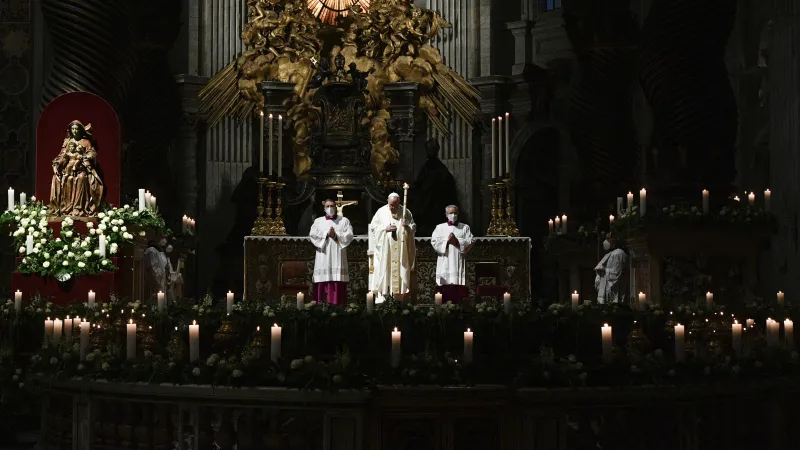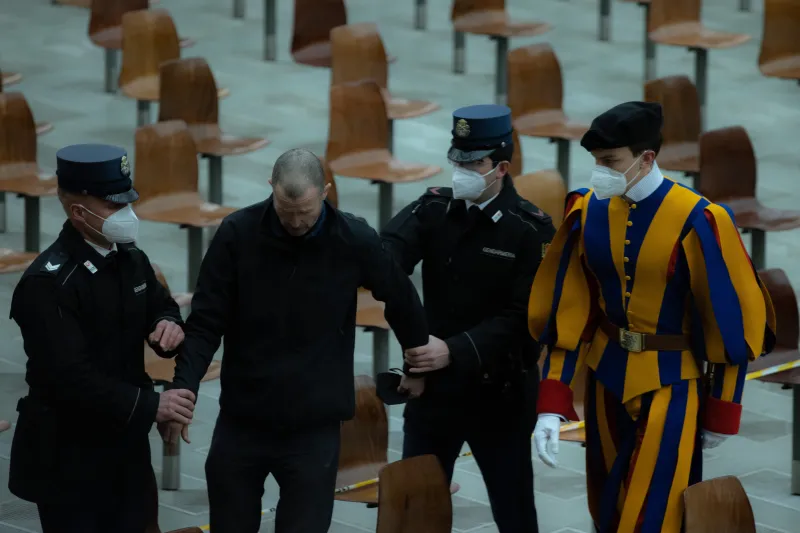
‘Made New’: Blessed Is She book explores Catholic women’s identity
 Nell O’Leary, managing editor of Blessed Is She. / Therese Westby
Nell O’Leary, managing editor of Blessed Is She. / Therese Westby
Washington, D.C. Newsroom, Feb 3, 2022 / 11:01 am (CNA).
When Nell O’Leary sat down with her team to brainstorm a new book for Catholic women, she said they felt drawn to the theme of “identity.”
“This one kept coming back, this idea of identity, of who we are as Catholic women, made in God’s image and likeness,” O’Leary, the managing editor of Blessed Is She, told CNA. This identity, she said, gets battered by the world “with all these lies that you are what you look like, you are your social media following, you are how successful you are, you are how many kids you have.”
Instead, O’Leary says, every woman is unconditionally loved as a “beloved daughter of God.”
This message is central to Made New: 52 Devotions for Catholic Women, a weekly devotional released in December. The book houses personal stories from five writers associated with Blessed Is She (BIS), a “sisterhood” of Catholic women who desire to grow in their faith through prayer and community. Each of the five — O’Leary, Leana Bowler, Brittany Calavitta, Jenna Guizar, and Liz Kelly — focus on a theme under the umbrella of identity: beheld, belong, beloved, believing, and becoming.
While their stories are different, their tone is consistent. Each writer engages the reader with the frank, casual tone of a friend who’s honest about her struggles, hopeful for the future, and, well, confident in her identity.
“I invite you to journey with me, dear sister, to walk through the next fifty-two weeks as we rediscover our value, our worth, and our identity in Our Lord’s eyes,” Guizar, the founder of BIS, writes in the book’s opening. “He is waiting for you and me, and He desires to be in relationship with us. All it takes is a response to His call: yes.”
Each week begins with a short reflection or personal story from one of the writers and concludes with a scripture passage and two questions for the reader to ask herself. Along the way, artwork interrupts the text to greet readers with dusty, muted colors and shapes. The rose-gold cover impresses a feminine touch, along with a pink ribbon bookmark. Leaves and plants adorn the pages, suggesting growth and life made new.

A saint’s calling
If readers come away remembering one thing, O’Leary wants them to believe and remember that “there’s no one way, cookie-cutter way, to become a saint.”
“God is calling you personally, through the circumstances in your life, through the challenges, through the blessings, to grow in holiness in who you are and where you are,” she said. “And to compare yourself to other women and feel like you can’t measure up is simply not where you want to put your energies.”
Instead, she said, God is calling each woman — in her particular, unique life — to become a saint.
Every woman is different, something that the five writers themselves demonstrate. According to O’Leary, they are not all just a “bunch of young moms.” One struggles with infertility, another married later in life, one started a family before marriage, and another has no children.
“I think that however old the reader is, they will find part of their own story,” O’Leary said. “When we write [our stories], we want the reader to actually be able to contemplate and ponder… to kind of find their own story. So you’re not just consuming another person’s content, you’re actually looking at yourself too.”
One story particularly moved O’Leary (even though she compared picking her favorite to “picking a favorite flower”). She pointed to writer Liz Kelly, who shares with readers her diagnosis with multiple sclerosis toward the end of the book.
While Kelly originally “thought that meant her role would become really small,” God “used her in that time and in that diagnosis to broadcast his message even further than she thought,” O’Leary summarized.
She added, “I think the reason I love that story so much is because where we see limitations, God just sees more opportunities for grace.”
Unconditional love
A theme in the book that O’Leary herself touches on is God’s unconditional love — that he loves you as you are right now, regardless of what you do or don’t do, regardless of how your family or friends treat you, regardless of your past or future. He loves you.
“I suppose people in general struggle with the idea of unconditional love because it’s so rarely manifest in our human interaction,” O’Leary said of accepting God’s love. “And so, because the human level of relationship in our lives are fraught with other imperfect people, to really trust in and experience God’s love takes this trust and this faith.”
Her first piece of advice for women who doubt God’s love or think they aren’t good enough is to visit the confessional.
“Get all those embarrassing sins off your chest,” she said. “The priest has heard it all … you can go behind the screen.”
“It’s nothing that’s too embarrassing to bring to the sacrament and really unload yourself of the burden of all those sins and experience God’s grace filling you,” she added. God’s unconditional love can get “so shrouded and clouded by my own, my own humanity, my own mistakes, my own sinfulness.”
Community and Covid
Another topic in the book — and a priority for Blessed Is She as a whole — is community. O’Leary addressed the challenges of community, particularly during the pandemic.
“Living in a global pandemic, so many things being more online, we just see that highlights reel…those drive those envy twinges of, ‘Her life looks perfect. She doesn’t have my struggles,’” she said. “Really puts in wedges in our sisterhood and we need our sisterhood.”
“When we can’t be together, it just starts to look like everyone has it together,” she added. “We don’t.”
O’Leary advised women to read the free daily devotions offered by Blessed Is She. And delete social media apps off of their phones, even if just for the weekend.
“I know that our phones and the internet are wonderful for connecting us, but they’re also really toxic for making it feel more lonely,” she said. “Live the life that’s in front of you.”
The personal
O’Leary talked about her personal life and her own struggle with identity. The fourth of five children, she said she grew up surrounded by high-achieving parents and siblings. While she thought that one day she might have a family, she worked toward becoming an attorney. She ended up marrying her “law school love” and worked as an attorney. Then, she became a stay-at-home mom.
“Realizing that I had hung so much on my identity being what I did, and what the world could see and applaud, that becoming a mom and then eventually staying at home with our kids,” she said. “It’s such a hidden life.”
“The children are not cheering you on, ‘You did a great job!’ there’s no affirmation, there’s no feedback other than the deep satisfaction I guess, that no one went to the ER,” she added.
The experience changed her.
“What I realized that I had to have a big mentality shift from, I’m not what I do and I’m not what I accomplish and I’m not even how my children behave,” she said. “That really, in these hidden moments in prayer with God, to say, ‘I know I’m your beloved daughter. I know I’m made in your image and likeness.’”






